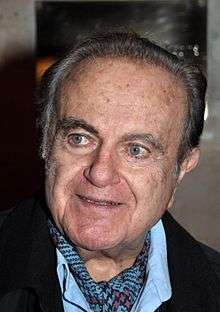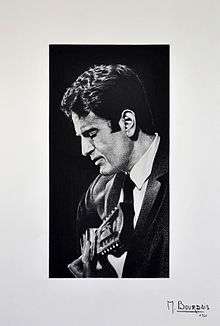Guy Béart
Guy Béhart-Hasson (French: [beaʁ]; 16 July 1930 – 16 September 2015), known as Guy Béart, was a French singer and songwriter.
Guy Béart | |
|---|---|
 Guy Béart in 2012 | |
| Born | Guy Béhart-Hasson 16 July 1930 |
| Died | 16 September 2015 (aged 85) Garches, France |
| Occupation | Singer Songwriter |
| Relatives | Emmanuelle Béart (daughter) |
Life and career
Béart was born Guy Béhart-Hasson (originally spelled Béhar-Hassan) in Cairo, Egypt[1][2] to Lebanese Jewish parents, Amélia (Taral) and David Béhart-Hasson.[3][4][5][6][7] His father's work as an accountant and business consultant saw the family move frequently, leading to a childhood spent in France, Greece, and Mexico, in addition to Egypt. His family settled in Lebanon where he did his secondary studies, between ten and seventeen years old, age at which he obtained his French baccalaureate in elementary mathematics at the International College of Beirut, where his interest in music developed to the point that he left for Paris to study at the "École nationale de musique". In addition to music, he also obtained a degree in engineering.
When his father died in 1952, the young Béhart chose to pursue a career in engineering in order to help support his family, studying at the prestigious École nationale des ponts et chaussées. Simultaneously, however, he enrolled in Paris's École nationale de musique, studying violin and mandolin, and in his spare time wrote songs and worked the Paris cabaret circuit, where he played guitar and sang under the stage name "Guy Béart". When a version of one of his songs by a popular performer of the day became a huge success, demand for his writing talents increased and he composed for Juliette Gréco and others. Taken under the wing of renowned music producer Jacques Canetti and fellow musician Boris Vian, he released an album of his own, which won the prestigious Grand Prix de l'Académie du Disque français in 1958.
Normally shy, Béart initially suffered from stage fright and struggled during his concert debut at the Paris Olympia. His biggest hit came when he wrote the soundtrack of the 1958 motion picture, L'Eau vive (Girl and the River in the USA).[8] The title song of the film is considered a classic of what is known as French chanson. Despite his leap to fame, Béart's singing career was soon swamped by the rising tide of American rock and roll. However, reinventing himself as a host of a television show featuring musical stars from a variety of genres, he remained in the public eye and eventually made a recording comeback.

In 1963[9] he and his wife, Geneviève Galea, had a daughter, Emmanuelle, who would grow up to be an actress.
After Béart's television show ended in 1970, his popularity waned but he continued to record new music that was readily purchased by a loyal following. He was the co-composer of the 1977 Luxembourg entry at the Eurovision Song Contest. By the early 1980s he was almost completely out of the spotlight and, although only in his early fifties, he suffered from a number of serious health problems. In 1987, he published a book about his illness entitled Crazy Hope that, combined with his daughter’s success in the blockbuster film Manon of the Spring, brought a resurgence of popularity. More than 25 years after his first appearance at the Paris Olympia, he returned for a series of highly successful performances.
In 1994, Béart was awarded the Grand Prix de l'Académie française in recognition of his achievements over his long career. He continued to perform at a variety of venues around the country and in 1999 did a five-week run at Bobino in Montparnasse that was so popular it allowed for a successful re-release of his double live album recorded at the Olympia.
In the 2000s, he only made rare appearances on stage but many of his songs, of which Béart wrote more than 300 by himself, are still popular with his fans.
Béart died of a heart attack at the age of 85 in Garches, on 16 September 2015.[10][11]
Discography
Albums
- Studio albums
- 1957: Guy Béart (or Qu'on est bien)
- 1958: Guy Béart Volume 2 (or L'Eau vive)
- 1960: Guy Béart Volume 3 (or Printemps sans amour)
- 1963: Guy Béart Volume 4 (or Fille d'aujourd'hui)
- 1965: Qui suis-je? (or Les grands principes)
- 1966: Vive la rose - Les très vieilles chansons de France
- 1968: La Vérité
- 1968: V'là l'joli vent - Les nouvelles très vieilles chansons de France
- 1969: La Fenêtre
- 1971: L'Espérance folle
- 1973: Couleurs du temps
- 1975: Il fait beau à Paris (compilation with previously unreleased materials)
- 1976: Chansons de notre temps et d'espérance
- 1977: Futur- Fiction- Fantastique (compilation with unreleased materials)
- 1978: Les Nouvelles Chansons
- 1981: Le beau miroir
- 1982: Porte-bonheur - Les chansons gaies des belles années
- 1986: Demain je recommence
- 1995: Il est temps
- 2010: Le Meilleur des choses
- Live albums
- 1974: À l'université (double album)
- 1977: À la Comédie des Champs-Élysées (triple album)
- 1999: En public (double CD)
- Compilation albums
- 2010: Best of (triple CD)
- 2014: Chansons éternelles de France
Songs
(Alphabetical order)
|
|
|
See also
- Une souris chez les hommes (film, 1964, music)
References
- Jon Henley (17 October 2007). "The kiss of death". The Guardian. UK. Retrieved 5 May 2011.
- Georges-Marie Matthijs. "Mathématiques et musique : GUY BÉART" (PDF). Jack200.free.fr. Retrieved 20 September 2015.
- Carol Binder (16 September 2015). "| Culture | Guy Béart: "Ma mère m'a enseigné les rituels juifs que je connais très bien" - Actualité Juive". Actuj.com. Retrieved 20 September 2015.
- "French immigrats to France". Mediapart.fr.
- Kerlereux, Pierre. "Eastern Christians". Besancon.fr.
- Salameh, Franck (2018). Lebanon’s Jewish Community: Fragments of Lives Arrested. Springer. p. 52. ISBN 978-3-319-99667-7.
- L'Eau vive on IMDb
- Emmanuelle Béart on IMDb
- "Guy Béart est mort". Lemonde.fr. 16 September 2015. Retrieved 20 September 2015.
- Kim Willsher. "Guy Béart obituary | Music". The Guardian. Retrieved 20 September 2015.
External links
| Wikimedia Commons has media related to Guy Béart. |
- Guy Béart on IMDb
- Disparition de Guy Béart (in French) at RFI
- Jack 200 (in French)